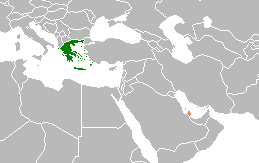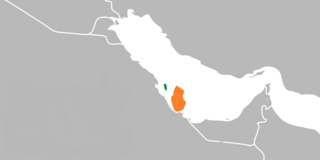
The history of Qatar spans from its first duration of human occupation to its formation as a modern state. Human occupation of Qatar dates back to 50,000 years ago, and Stone Age encampments and tools have been unearthed in the Arabian Peninsula. Mesopotamia was the first civilization to have a presence in the area during the Neolithic period, evidenced by the discovery of potsherds originating from the Ubaid period near coastal encampments.

The Cooperation Council for the Arab States of the Gulf, also known as the Gulf Cooperation Council, is a regional, intergovernmental, political, and economic union comprising Bahrain, Kuwait, Oman, Qatar, Saudi Arabia, and the United Arab Emirates. The council's main headquarters is located in Riyadh, the capital of Saudi Arabia. The Charter of the GCC was signed on 25 May 1981, formally establishing the institution.

The national flag of Qatar is in the ratio of 11:28. It is maroon with a broad white serrated band on the hoist side. It was adopted shortly before the country declared independence from the United Kingdom on 3 September 1971.
The Qatari riyal is the currency of the State of Qatar. It is divided into 100 dirhams.
The education system in Qatar is jointly directed and controlled by the Supreme Education Council (SEC) and the Ministry of Education and Higher Education (MOEHE) at all levels. The SEC is responsible for overseeing independent schools, whereas the MOE is responsible for providing support to private schools. Formal schooling officially began in 1956. Primary schooling is obligatory for every child and is free in public schools.

Sheikh Tamim bin Hamad Al Thani is Emir of Qatar, reigning since 2013.

Qatar, officially the State of Qatar, is a country in West Asia. It occupies the Qatar Peninsula on the northeastern coast of the Arabian Peninsula in the Middle East; it shares its sole land border with Saudi Arabia to the south, with the rest of its territory surrounded by the Persian Gulf. The Gulf of Bahrain, an inlet of the Persian Gulf, separates Qatar from nearby Bahrain. The capital is Doha, home to over 80% of the country's inhabitants, and the land area is mostly made up of flat, low-lying desert.

The Qatar Red Crescent Society, the Qatari branch of the Red Crescent Society, was established in 1978. In 1981, it gained international recognition from the International Committee of the Red Cross in Geneva and joined the International Federation of Red Cross and Red Crescent Societies (IFRC). It is also a member of the Secretariat of Arab Red Crescent Societies in Jeddah. It became the first philanthropic organization in Qatar to establish a women's branch in 1982.

Greece–Qatar relations are the bilateral relations between Greece and Qatar. Relations were established in 1973.

Al Mamoura is a district in the municipality of Al Rayyan in Qatar. Many international schools are found here.

Qatar–Russia relations are the bilateral foreign relations between the two countries, Qatar and Russia.

The State of Qatar and the Republic of Turkey established bilateral relations in 1972. There has been ongoing cooperation and dialogue in regional and international issues since the 2010s, particularly in the Syrian Civil War and the Egyptian Crisis. Both countries also support the same groups in post-Gaddafi Libya. Most recently, Turkey provided diplomatic and food support to Qatar during the 2017 Qatar diplomatic crisis. Some political analysts claim that bilateral relations are mostly limited to political and military affinity, referring to the low trade volume, lack of trade agreements and absence of Turkish think tanks in Qatar.

Ahmed Alaaeldin, also known as Ahmed Alaa, is a professional footballer who currently plays for Al-Gharafa. Born in Egypt, he plays for the Qatar national football team.
The Qatar Computing Research Institute (QCRI) in Doha, Qatar, is a nonprofit multidisciplinary computing research institute founded by the Qatar Foundation (QF) for Education, Science and Community Development in 2010. It is primarily funded by the Qatar Foundation, a private, non-profit organization that is supporting Qatar on its journey from carbon economy to knowledge economy.
The Arab sign-language family is a family of sign languages spread across the Arab Middle East. Its extent is not yet known, because only some of the sign languages in the region have been compared.

Women's rights in Qatar are restricted by the country's male guardianship law - currently the only remaining country in the Gulf region with such laws - and influenced by the Wahhabi interpretation of Islam. Both women and men were enfranchised in the country at the same time, in 1999. Labour force participation rates of Qatari women are above the world average and among the highest in the Arab World, which comes mainly as a result of an increasing number of Qatari women who are attaining academic degrees.
Visitors to Qatar must obtain a visa, unless if they are citizens of one of the GCC countries or if they are citizens of one of the countries eligible for a visa waiver on arrival.

Bilateral relations exist between the State of Qatar and the Kingdom of Bahrain. They first began in 1971.

China – Qatar relations are the bilateral relations between the People's Republic of China and the State of Qatar. China has an embassy in Doha, while Qatar has an embassy in Beijing. With diplomatic relations first formed in 1988, Qatar is a strategic ally of China, and the two countries maintain a strong relationship.

The State of Qatar and the Kingdom of Spain formed diplomatic relations in December 1972. Qatar maintains an embassy in Madrid, while Spain has an embassy in Doha.












